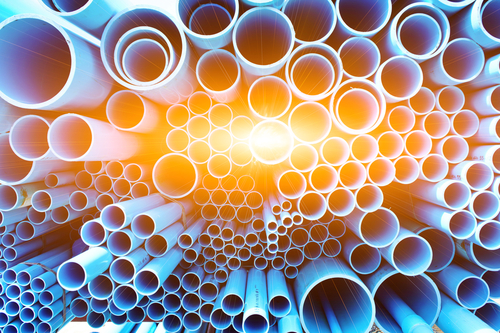PVC
PVC is a plastic material used to build many different products. Its characteristics make it safe to be used in various industrial fields, especially because of its extremely low price and great durability. As any other material, before being sold to the end customer it must undergo different processing stages that transform the little beads of plastic into those very useful objects we see in our houses every day.
Plasticol is one of the main manufacturer of PVC in Italy. The business’s headquarters are built on a 7000 square meters area in Samarate, a small industrial city located in Lombardy. Our company has 12 different production lines, one of which is destined to the manufacture of extruded PVC products. Let’s find out the characteristics of this material, where it is used, and how it is produced.
Extruded PVC products: characteristics
PVC stands for polyvinyl chloride, and it’s a plastic material known for its many different properties that make it perfect for many industrial sectors as the building one, for example. PVC comes in two different forms, a rigid one which is also the most common, and a flexible one.
Its basic characteristics can be manipulated through the use of some additives. In fact, PVC can be transformed into a fire safe plastic, which comes in handy in those fields in which safety is a really important matter, but it can also be made more elastic with the use of certain chemical products.
Generally speaking, PVC is resistant to high mechanical stress, it can bear environments in which acids, bases, fats, alcohols, and salts are massively present, and it is also a good insulator. As we already stated before, even with all these high-quality characteristics this material is really cheap.
Extruded PVC products: production process and uses
PVC originally comes in the form of tiny beads that are shaped into different objects through the extrusion process. The beads are pushed into a barrel, thanks to a rotating screw; here the high temperature, caused by the friction of the material rubbing on itself and the barrel, melts them. The melted plastic is then pushed into a mold that gives it its final shape.
PVC can be molded into cables, gaskets and plastic profiles. These objects can be used as electric cables, seals for pipes or as a protection to insulate the interior of our houses from the outside as it happens with the outline of window structures.
Feel free to contact Plasticol for any business inquiries, for an estimate, or to learn more about the collateral services that our company offers to its clients.
Location:
Via San Carlo 35
21017- Samarate (VA)
Phone: (+39) 0331 234 212
Fax: (+39) 0331 235 108
Email: info@plasticol.it

